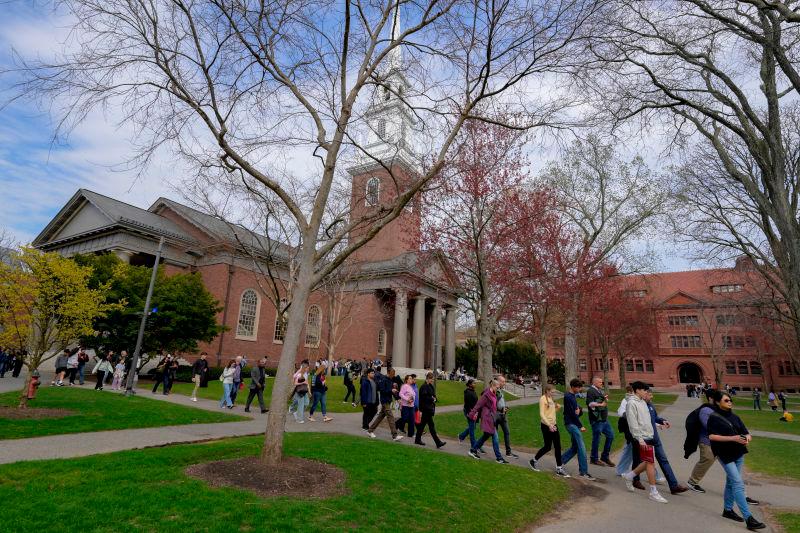HARVARD scientist Dr. Donald Ingber, who works where medicine and engineering meet, saw federal funding for some of his projects frozen this week as his university clashed with the administration of U.S. President Donald Trump.
While Trump and his advisers portray the freezes as a temporary measure employed to force Harvard to make policy changes and address antisemitism on campus, Ingber and other scientists see long-term negative impacts on a tradition of partnerships between the government and university researchers dating back to World War II that made the U.S. the most technologically powerful country on earth. Scientists say the damage is already aiding competitive rivals like China.
“We’re killing the Golden Goose of innovation that has let America be the scientific leader in the world,“ said Ingber, the founding director of the Wyss Institute for Biologically Inspired Engineering. “This is destroying our competitiveness.”
He has seen two government research contracts worth over $20 million halted since the Trump administration announced a $2.3 billion funding freeze against Harvard this week. One focused on assessing and developing drugs to combat radiation damage in humans. The work can be the basis for drugs to help cancer patients cope with the side effects of radiation therapy, and it could be used to protect soldiers and civilians alike in the case of nuclear war or during a nuclear plant explosion.
The Harvard funding freeze came after the school rejected government-mandated reforms of its academic programs, admissions process and hiring practices that are meant to stamp out what the Trump administration sees as the “radical left” at the school and other colleges across the country.
Trump officials point to the wave of pro-Palestinian protests at several schools last year following the 2023 war in Israel and Gaza as a rationale for its demands. However, critics among faculty and student groups say the measures are designed to chill speech and that campuses should be a place for freedom of speech and academic thought.
Ingber said he knows of post-doc applicants who are now turning down research positions in the U.S. that they had accepted because they are afraid to live in America as foreigners. They are turning to China or Europe to carry out their work.
“We were the magnet for the best young scientists around the world to come and pursue innovation,“ Ingber said. “It’s over. After three months of this administration, it is over.”
White House spokesman Kush Desai said that the funding freeze on Harvard and Columbia “is motivated by one thing and one thing only: tackling antisemitism.”
“Antisemitic protestors inflicting violence and taking over entire college campus buildings is not only a crude display of bigotry against Jewish Americans, but entirely disruptive to the intellectual inquiry and research that federal funding of colleges is meant to support,“ Desai said.
The Department of Education did not respond to a request for comment.
'Long, lasting effects'
Since the end of World War II, the government has identified strategic areas of research in public health, military or other areas. Researchers then respond by proposing projects, of which less than the top 10% may receive federal funding.
For decades universities have provided infrastructure and administration for these joint projects. The researchers are most often independent of the colleges, with no teaching duties or connections to the student politics that have riled universities' relationships with the federal government.
Noam Ross, executive director of rOpenSci, a non-profit global initiative that supports open and reproducible research, is helping lead the creation of a database where canceled grants and contracts are listed, culled from scientists' reports, notifications on government websites, legal cases and news reports. Ross hopes the scientific community can use the information in legal battles or to better make its case in the court of public opinion.
“You need information available to people so they can understand the impact of the administration, and understand what it means that they’re going after the health and scientific enterprise that has powered this country’s economy and progress for 100 years,“ Ross said.
Ross has compiled data on funding cuts to research on transgender health or DEI, issues the Trump administration has targeted. But it also shows the threats to research at Harvard, Columbia and scores of other colleges.
Columbia University researchers and administrators went through what Harvard's Ingber is experiencing now in March, after the Trump administration said it was terminating grants and contracts worth $400 million to the university.
Among the Columbia projects affected by the Trump administration's funding freeze was a study designed to improve the safety of blood transfusion therapies for adults, children and newborns, and research on uterine fibroids, non-cancerous tumors that can cause pain and affect women's fertility.
Dr. Ronald Collman, director of the University of Pennsylvania's Center for AIDS Research, said his center has seen cuts made by the Trump administration, and he felt compelled to help the public understand what is at stake is not funding for a new recreation center for privileged Ivy League students.
“Sure, the researchers get a short-term punishment, but the long-term costs, the real punishments, are for the public who will not get the benefits of the discoveries,“ Collman said, emphasizing that he was not speaking on behalf of his university.
He added that incentivizing research is “the American way.”
“This notion now that the central government is going to control every aspect of the research is how we destroy that, it’s how we will make China great,“ Collman said. “It’s going to have long, lasting effects.” (Reporting by Brad Brooks in Colorado; Additional reporting by Jonathan Allen in New York; Editing by Donna Bryson and Aurora Ellis)









